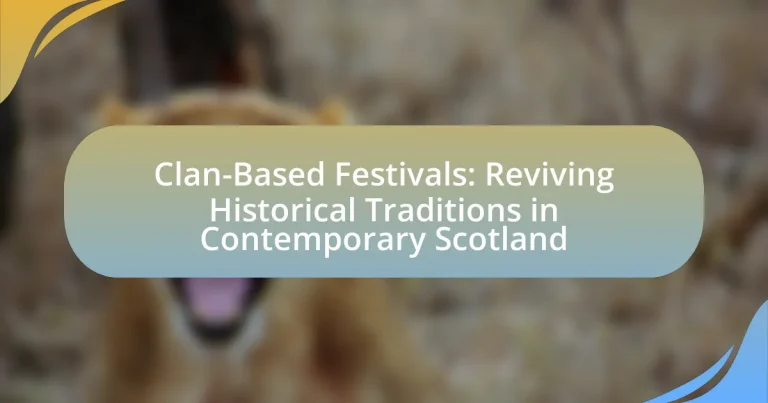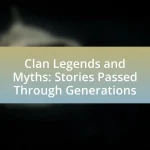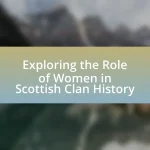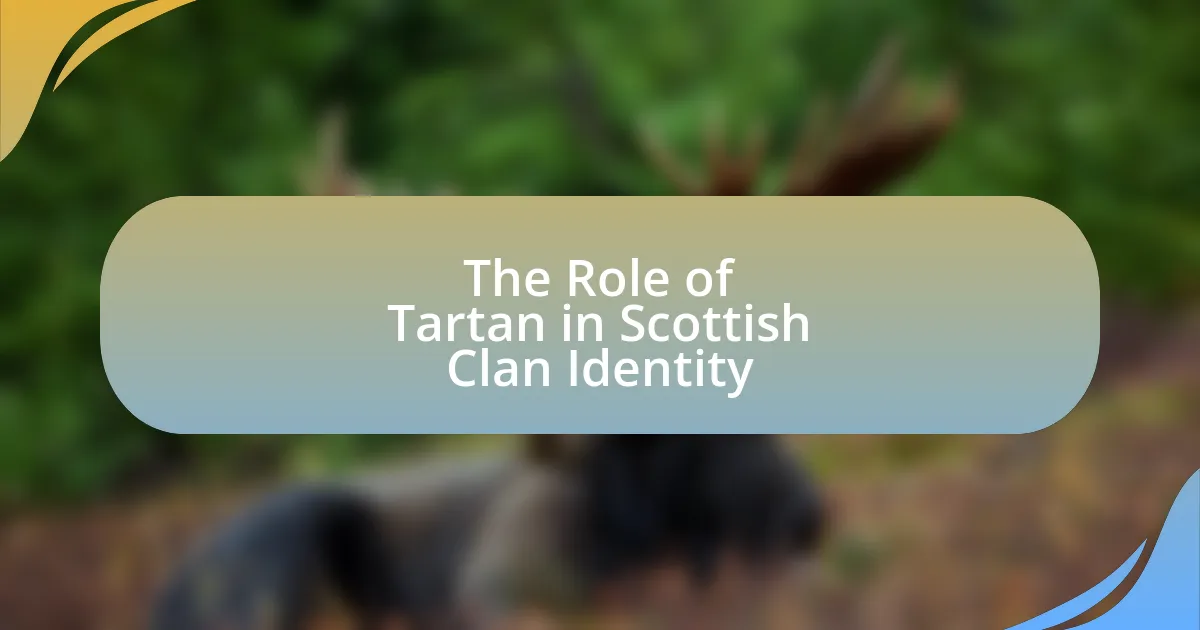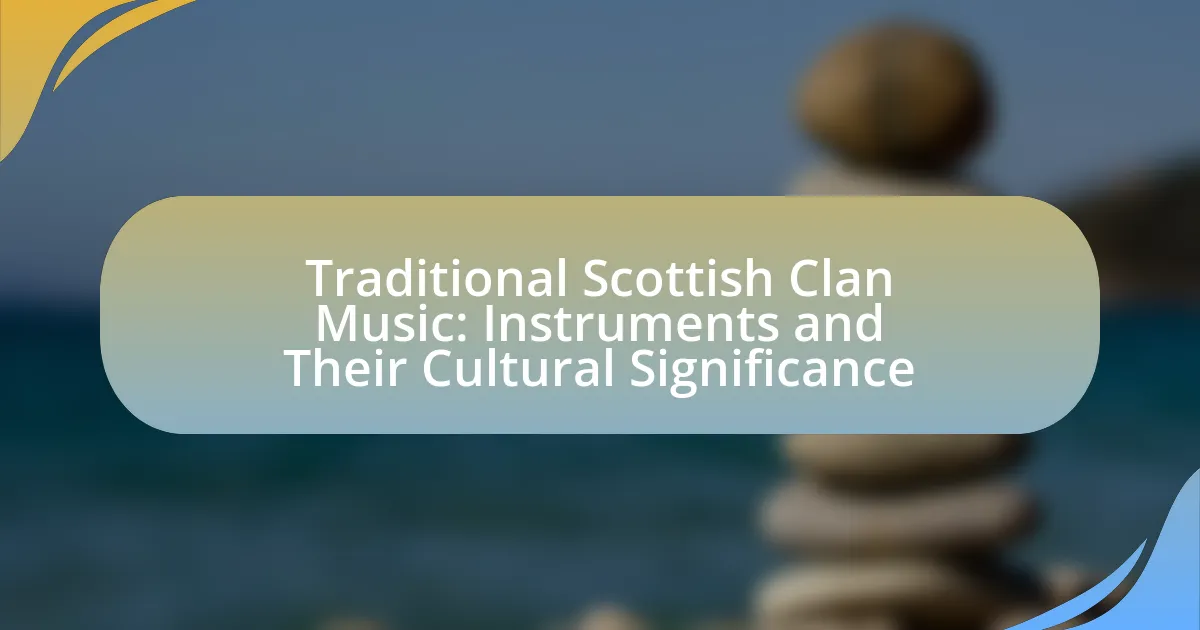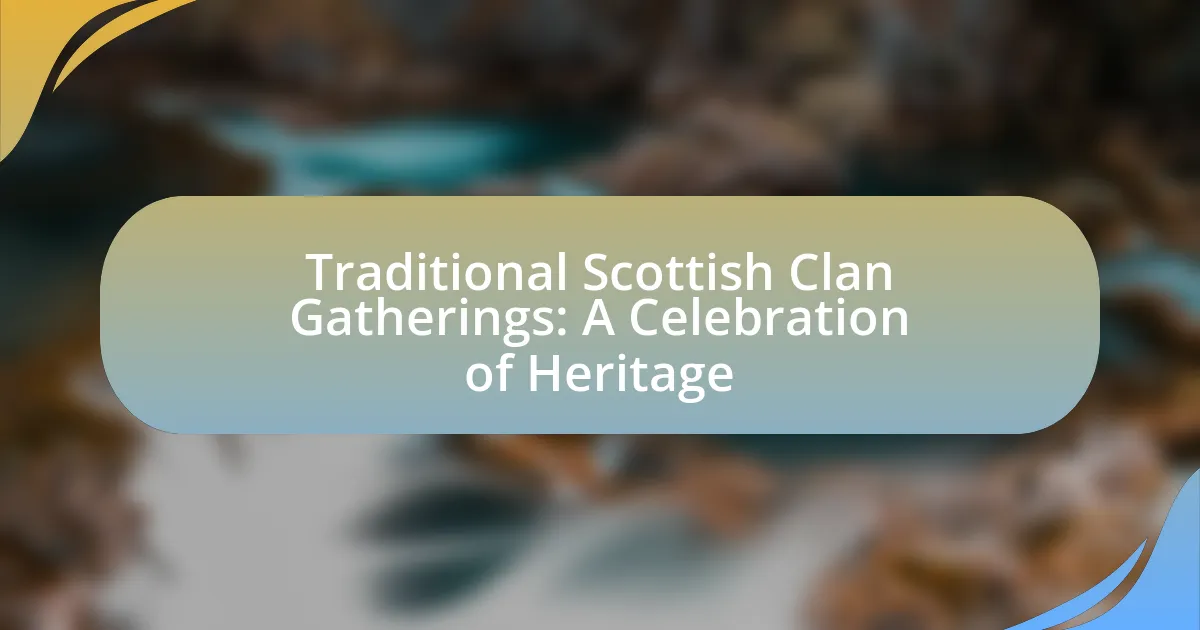Clan-based festivals in Scotland are cultural events that celebrate the heritage and traditions of specific Scottish clans, featuring traditional music, dance, sports, and displays of clan history. These festivals, such as the Highland Games and Clan Gatherings, play a crucial role in preserving Scottish identity and fostering community ties. They reflect historical events that shaped clan identities, promote tourism, and adapt to contemporary influences while facing challenges like declining participation and financial sustainability. Attendees can expect a vibrant experience that includes athletic competitions, storytelling, and opportunities to engage with Scottish culture.
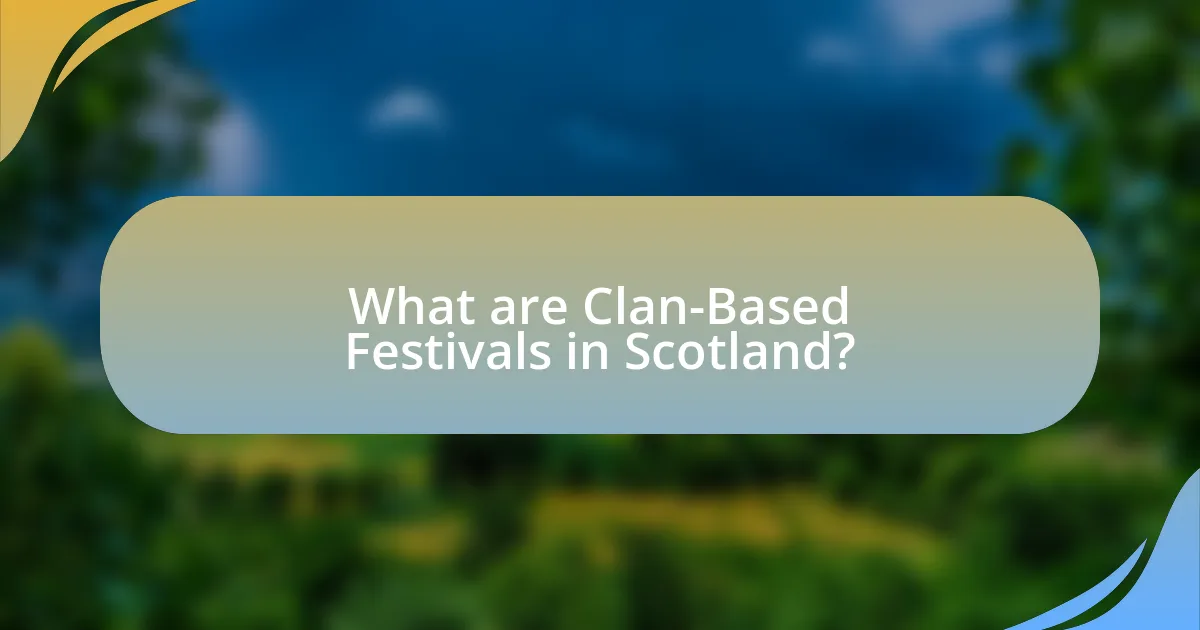
What are Clan-Based Festivals in Scotland?
Clan-based festivals in Scotland are cultural events that celebrate the heritage, traditions, and identities of specific Scottish clans. These festivals often feature traditional music, dance, sports, and displays of clan history, fostering a sense of community among clan members and promoting Scottish culture. Notable examples include the Clan Gathering at the Scottish Highland Games, where clans showcase their unique customs and engage in friendly competitions, reinforcing the historical significance of clan affiliations in Scotland.
How do Clan-Based Festivals reflect Scottish heritage?
Clan-based festivals reflect Scottish heritage by celebrating the historical and cultural identity of Scottish clans through traditional music, dance, and customs. These festivals often feature clan gatherings, showcasing tartans, heraldry, and ancestral storytelling, which reinforce the connection to Scottish history and lineage. For instance, events like the Royal Edinburgh Military Tattoo and the Gathering at Edinburgh highlight the significance of clan culture, drawing thousands of participants and spectators who engage in activities that honor their ancestry. Such festivals serve as a living testament to Scotland’s rich traditions, preserving and promoting the unique aspects of Scottish identity for future generations.
What historical events led to the establishment of Clan-Based Festivals?
The establishment of Clan-Based Festivals in Scotland was primarily influenced by the Highland Clearances of the 18th and 19th centuries, which led to the displacement of many clans and a subsequent revival of clan identity. This revival was further fueled by the Romantic movement in the 19th century, which idealized Scottish culture and heritage, prompting clans to organize festivals to celebrate their history and traditions. Additionally, the 2000s saw a resurgence in interest in Scottish heritage, leading to the formalization of these festivals as a means to reconnect communities with their ancestral roots and promote cultural pride.
How do these festivals celebrate clan identities?
Clan-based festivals celebrate clan identities by showcasing traditional customs, music, and attire specific to each clan, thereby reinforcing a sense of belonging and heritage among participants. These festivals often feature clan gatherings, where members engage in activities such as storytelling, dancing, and competitions that highlight their unique histories and values. For instance, events like the Clan Gathering at the Scottish Highland Games allow clans to display their distinct tartans and symbols, fostering pride and unity within the clan community. Additionally, educational workshops and historical reenactments during these festivals provide context and depth to the clan’s legacy, ensuring that younger generations understand and appreciate their ancestral roots.
Why are Clan-Based Festivals important in contemporary Scotland?
Clan-based festivals are important in contemporary Scotland because they serve as a vital means of cultural preservation and community identity. These festivals celebrate Scottish heritage, allowing clans to reconnect with their historical roots and traditions, which fosters a sense of belonging among participants. For instance, events like the Clan Gathering and the Scottish Highland Games attract thousands of attendees, showcasing traditional music, dance, and sports, thereby reinforcing cultural ties. Additionally, these festivals contribute to local economies through tourism, with the Scottish Government reporting that events related to heritage and culture significantly boost visitor numbers and spending in the region.
What role do these festivals play in community building?
Clan-based festivals play a crucial role in community building by fostering social cohesion and cultural identity among participants. These festivals serve as a platform for individuals to connect with their heritage, engage in shared traditions, and strengthen communal bonds. For instance, events like the Clan Gathering in Scotland not only celebrate historical ties but also encourage collaboration among clans, enhancing a sense of belonging and unity. Research indicates that such festivals can increase community engagement and participation, as evidenced by the rise in attendance and local involvement in organizing these events, which reinforces social networks and collective identity within the community.
How do Clan-Based Festivals contribute to tourism in Scotland?
Clan-based festivals significantly contribute to tourism in Scotland by attracting visitors interested in cultural heritage and historical traditions. These festivals, such as the Clan Gathering and Highland Games, showcase traditional Scottish music, dance, and sports, drawing both locals and international tourists. For instance, the Royal Edinburgh Military Tattoo, which features clan performances, attracts over 200,000 visitors annually, generating substantial economic impact through accommodation, dining, and local attractions. Additionally, these events foster community engagement and promote Scotland’s unique identity, further enhancing its appeal as a tourist destination.
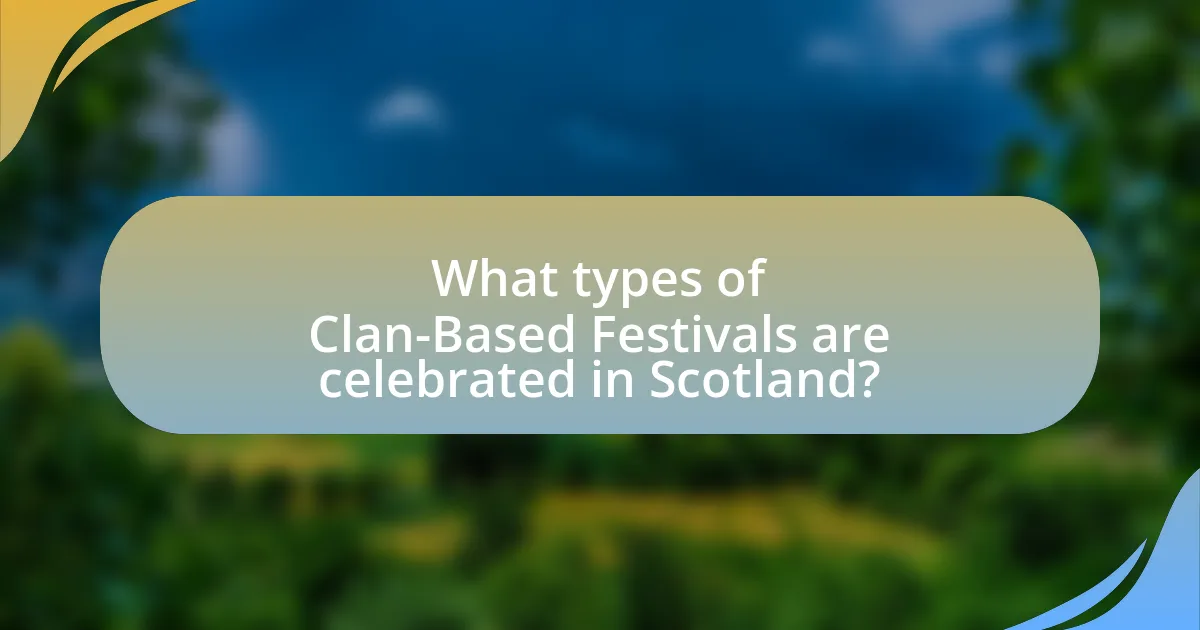
What types of Clan-Based Festivals are celebrated in Scotland?
Clan-based festivals celebrated in Scotland include Highland Games, Clan Gatherings, and Clan Festivals. Highland Games feature traditional athletic competitions, dancing, and music, celebrating Scottish culture and clan heritage. Clan Gatherings are organized events where members of specific clans come together to honor their ancestry, often including parades and cultural displays. Clan Festivals, such as the Clan Macpherson Festival, showcase clan history, crafts, and local traditions, reinforcing community ties and cultural identity. These festivals serve to revive and maintain historical traditions within contemporary Scottish society.
How do different clans organize their festivals?
Different clans organize their festivals through a combination of traditional practices, community involvement, and cultural heritage preservation. Each clan typically selects a specific date, often aligned with historical events or seasonal changes, to celebrate their unique identity and history. For instance, clans may incorporate traditional music, dance, and storytelling into their festivals, reflecting their ancestral roots. Additionally, clans often collaborate with local communities and organizations to enhance participation and ensure the events are inclusive. This approach not only fosters a sense of belonging among clan members but also attracts visitors, thereby promoting cultural exchange and tourism. Historical records indicate that such festivals have been integral to clan identity in Scotland, with events like the Clan Gathering serving as a focal point for clan members to reconnect and celebrate their heritage.
What are the unique features of Highland Games?
Highland Games are characterized by unique features such as traditional athletic competitions, cultural displays, and community engagement. The athletic events include the caber toss, hammer throw, and tug of war, which showcase strength and skill rooted in Scottish heritage. Additionally, the games often feature piping and dancing competitions, emphasizing the cultural significance of music and dance in Scottish tradition. These events foster community spirit and clan pride, drawing participants and spectators from various backgrounds to celebrate Scottish culture. The Highland Games have historical origins dating back to the 11th century, serving as a platform for clans to demonstrate their prowess and unity.
How do clan gatherings differ from other cultural festivals?
Clan gatherings differ from other cultural festivals primarily in their focus on familial lineage and heritage. Unlike broader cultural festivals that celebrate a wide array of traditions and practices, clan gatherings specifically emphasize the history, identity, and connections of a particular clan or family group. For instance, clan gatherings often include activities such as ancestral storytelling, traditional games unique to the clan, and rituals that honor the clan’s lineage, which are not typically found in general cultural festivals. This focus on kinship and shared ancestry is reinforced by the historical significance of clans in Scotland, where clan identity has played a crucial role in social structure and community cohesion.
What activities are typically included in Clan-Based Festivals?
Clan-based festivals typically include traditional music performances, dance displays, storytelling, athletic competitions, and craft exhibitions. These activities celebrate the cultural heritage of specific clans, showcasing their unique customs and traditions. For instance, athletic competitions often feature events like caber tossing and tug-of-war, which have historical significance in Scottish culture. Additionally, music and dance performances highlight traditional Scottish instruments and folk dances, reinforcing the clan’s identity and community spirit.
What traditional games and sports are featured?
Traditional games and sports featured in Clan-Based Festivals in Scotland include caber tossing, tug of war, and hammer throw. These events are rooted in Scottish heritage and are often showcased during clan gatherings to celebrate cultural identity. For instance, caber tossing, a test of strength and skill, involves lifting and flipping a tall wooden log, symbolizing the connection to Scotland’s agricultural past. The hammer throw, where competitors throw a heavy weight attached to a long handle, also reflects the physical prowess valued in Scottish tradition. These games not only entertain but also serve to preserve and promote Scotland’s rich cultural history.
How do music and dance play a role in these festivals?
Music and dance are central to clan-based festivals in Scotland, serving as vital expressions of cultural identity and community cohesion. These festivals often feature traditional Scottish music, such as bagpipes and folk songs, which evoke historical narratives and foster a sense of belonging among participants. Dance, particularly forms like ceilidh dancing, encourages communal participation and reinforces social bonds, allowing attendees to engage actively with their heritage. Historical records indicate that music and dance have been integral to Scottish celebrations for centuries, highlighting their enduring significance in preserving clan traditions and promoting cultural continuity.
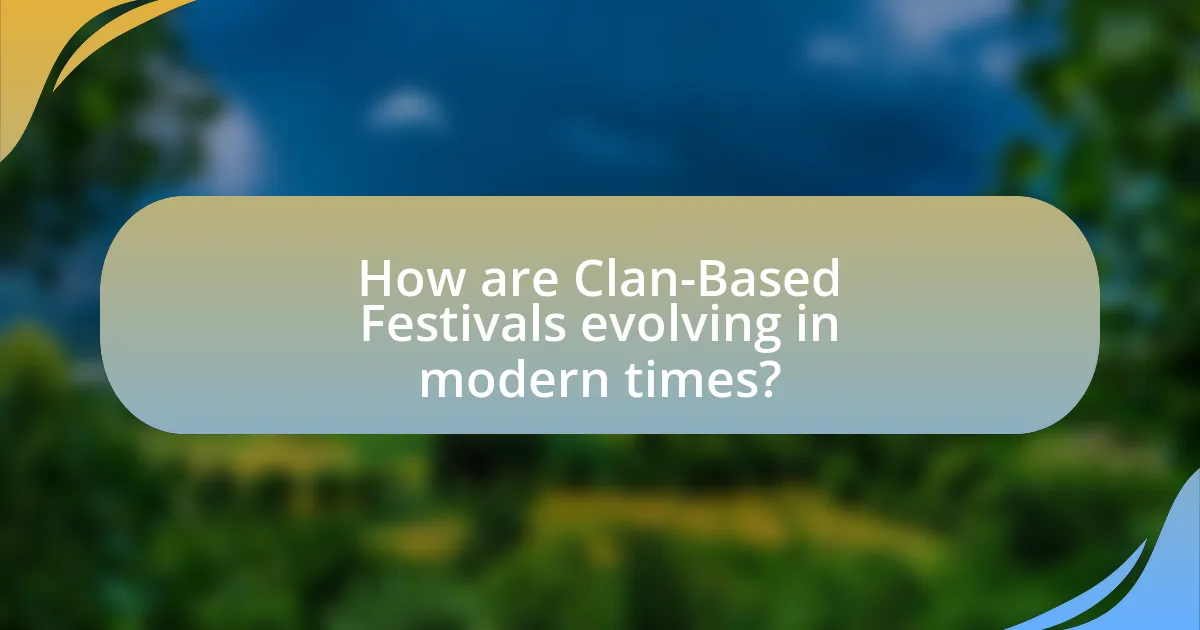
How are Clan-Based Festivals evolving in modern times?
Clan-based festivals are evolving in modern times by incorporating contemporary cultural elements and technology while maintaining traditional practices. These festivals now feature modern music, art, and food, appealing to younger generations and fostering community engagement. For instance, the incorporation of social media platforms has enhanced participation and outreach, allowing clans to connect with a global audience. Additionally, many festivals now include educational workshops that focus on clan history and heritage, ensuring that traditional knowledge is passed down. This evolution reflects a blend of preserving cultural identity while adapting to the changing social landscape, as evidenced by the increasing attendance and participation rates in events like the Clan Gathering in Scotland, which saw a 30% increase in visitors over the past five years.
What contemporary influences are shaping these festivals?
Contemporary influences shaping clan-based festivals in Scotland include globalization, social media, and a growing interest in heritage tourism. Globalization has facilitated the exchange of cultural practices, leading to the incorporation of diverse elements into traditional festivals. Social media platforms enable wider promotion and engagement, attracting both local and international attendees. Additionally, the rise of heritage tourism has increased public interest in historical traditions, prompting festival organizers to emphasize authenticity and cultural education. These influences collectively enhance the relevance and appeal of clan-based festivals in today’s society.
How are technology and social media impacting festival participation?
Technology and social media significantly enhance festival participation by facilitating communication, promoting events, and fostering community engagement. Social media platforms allow festival organizers to reach wider audiences through targeted advertising and event promotion, resulting in increased attendance. For instance, a study by Eventbrite found that 93% of event creators use social media to promote their events, leading to higher visibility and engagement. Additionally, technology enables real-time updates and interactions, allowing attendees to share experiences instantly, which further attracts more participants. This interconnectedness not only boosts attendance but also strengthens the sense of community among festival-goers, particularly in the context of clan-based festivals that celebrate historical traditions in Scotland.
What changes have been made to attract younger generations?
To attract younger generations, clan-based festivals in Scotland have incorporated modern elements such as live music, food trucks, and interactive activities. These changes aim to create a vibrant atmosphere that resonates with younger audiences, moving away from traditional formats that may seem outdated. For instance, the introduction of social media campaigns has increased engagement, allowing younger attendees to share their experiences online, thus enhancing visibility and appeal. Additionally, festivals now feature contemporary themes and collaborations with local artists, making the events more relatable and enjoyable for younger participants.
What challenges do Clan-Based Festivals face today?
Clan-based festivals today face challenges such as declining participation, financial sustainability, and cultural relevance. Declining participation is evident as younger generations show less interest in traditional customs, leading to reduced attendance at events. Financial sustainability is a significant issue, as many festivals rely on donations and sponsorships, which have become increasingly difficult to secure in a competitive funding environment. Additionally, cultural relevance poses a challenge, as festivals must adapt to modern societal values while preserving their historical significance, risking alienation of potential attendees who may not connect with traditional practices. These challenges threaten the viability and continuity of clan-based festivals in contemporary Scotland.
How is climate change affecting outdoor festivals?
Climate change is significantly affecting outdoor festivals by altering weather patterns, leading to increased instances of extreme weather events such as heavy rainfall, heatwaves, and storms. These changes can disrupt festival schedules, reduce attendance, and pose safety risks for participants. For example, a study by the UK Centre for Ecology & Hydrology indicates that the frequency of heavy rainfall events has increased by 30% in the UK over the past few decades, which directly impacts outdoor events. Additionally, rising temperatures can lead to heat-related health issues for attendees, further complicating festival planning and execution.
What are the financial challenges for organizing these events?
The financial challenges for organizing clan-based festivals in contemporary Scotland include high costs for venue rental, staffing, and marketing. These events often require significant upfront investment, with venue rental fees averaging between £1,000 to £5,000 depending on location and size. Additionally, staffing costs can escalate due to the need for security, event coordinators, and volunteers, which can collectively exceed £10,000. Marketing expenses, essential for attracting attendees, can also range from £500 to £3,000, depending on the scale of the promotional efforts. Furthermore, securing sponsorships and funding can be difficult, as many potential sponsors may prioritize larger, more commercially viable events, leaving clan festivals at a financial disadvantage.
What can attendees expect from Clan-Based Festivals?
Attendees can expect a vibrant celebration of Scottish heritage at Clan-Based Festivals, featuring traditional music, dance, and cultural displays. These festivals often include clan gatherings, where members can connect with their ancestry, participate in athletic competitions like caber tossing, and enjoy food stalls offering traditional Scottish cuisine. Historical reenactments and storytelling sessions further enrich the experience, providing insights into Scotland’s rich past. Such events not only foster community spirit but also promote the preservation of cultural traditions, making them a significant aspect of contemporary Scottish identity.
How can visitors engage with the cultural aspects of the festivals?
Visitors can engage with the cultural aspects of clan-based festivals in Scotland by participating in traditional activities such as storytelling, music, and dance performances. These festivals often feature live demonstrations of historical crafts, allowing attendees to learn about ancestral skills and practices. For instance, events may include workshops on weaving or pottery, which are integral to Scottish heritage. Additionally, visitors can immerse themselves in the culture by attending clan gatherings, where they can interact with clan members and learn about their history and traditions. Engaging with local food and drink offerings, which often reflect regional specialties, further enhances the cultural experience. These activities not only provide entertainment but also foster a deeper understanding of Scotland’s rich cultural tapestry.
What tips can enhance the festival experience for newcomers?
To enhance the festival experience for newcomers, it is essential to engage with the local culture and participate in activities. Newcomers should familiarize themselves with the festival schedule, attend workshops, and interact with clan representatives to gain insights into historical traditions. Engaging in these activities allows newcomers to appreciate the significance of the festival, as evidenced by the increased participation rates in workshops and cultural demonstrations at clan-based festivals in Scotland, which often lead to a deeper understanding of the heritage being celebrated.
